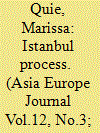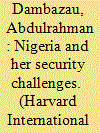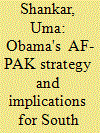|
|
|
Sort Order |
|
|
|
Items / Page
|
|
|
|
|
|
|
| Srl | Item |
| 1 |
ID:
134216


|
|
|
|
|
| Publication |
2014.
|
| Summary/Abstract |
In 2014, Afghanistan will confront profoundly significant challenges: international troops will withdraw and a pivotal presidential election is scheduled in April. In anticipation, the USA has outlined the 'New Silk Road' vision, as part of an attempt to move away from military solutions towards a notion of regional connectivity in South Central Asia. This vision has been the target of extensive criticisms, especially in terms of a perceived gap between rhetoric and reality, yet it is striking that a major segment of the region has begun to take ownership and move in new directions. A key manifestation of this shift is 'The Istanbul Process on Regional Security for a Secure and Stable Afghanistan' (IP) launched in 2011. This article evaluates what has been achieved thus far and the obstacles which may undermine a full realisation of the process. The IP's focus is on 'connectivity', engaging the landlocked nation of Afghanistan and safeguarding it from the isolation which fomented extremism and conflict in the past. Expanded connections must also take account of divisions between participating nations, the potency of the insurgency, the weaknesses of the Afghan state and issues without direct linkage with Afghanistan such as the ongoing conflict in Syria. If the process enjoys even a modicum of success, further regional crises might be averted, and new opportunities for sustainable development will be uncovered
|
|
|
|
|
|
|
|
|
|
|
|
|
|
|
|
| 2 |
ID:
137553


|
|
|
|
|
| Summary/Abstract |
The military transformation process typically focuses on the structural, operational, technical, personnel, training, and similar dimensions. Yet conceptual and practical approaches to such transformation have largely neglected the importance of the perceptional and subjective aspects that have frequently negatively affected this process. This article fills this gap by developing the Input-Process-Output Transformation Model and testing it on a sample of 55 military transformation experts from 23 NATO and PfP countries. The results highlight what are perceived to be the most important variables affecting the transformation input, process, and output that need to be incorporated in future integrated transformation strategies. It also turns out that transformation strategies need to increase the involvement of civil society, improve public support, the level of internal understanding of transformation goals, and the level of experimentation.
|
|
|
|
|
|
|
|
|
|
|
|
|
|
|
|
| 3 |
ID:
132546


|
|
|
|
|
| Publication |
2014.
|
| Summary/Abstract |
Nigeria's importance to global security hinges on the fact she is not only the most populous country in Africa, but also strategically located in a region (Gulf of Guinea) that is a major source of the world's oil. From the 1960 Congo crisis when Nigeria began contributing troops for international peacekeeping, the country has maintained consistency as a key player in both the United Nations and regional peacekeeping missions, thus contributing to world peace. However, Nigeria is currently facing serious internal security challenges, the most serious ones being the Boko Haram insurgency in the northeastern states of Borno, Yobe and Adamawa; and the Niger Delta militancy and piracy in the south-south geopolitical zone, comprising Bayelsa, Delta and Rivers. Additionally, there are security challenges posed by violent crimes, ethno-religious conflicts, resource-based conflicts, trans-border criminal activities, and election-induced violence. All these security challenges undoubtedly pose some threats to the social, economic and political stability of not only Nigeria, but also of the African continent, especially the West African sub-region, where more than half the population comes from Nigeria. While several factors could have contributed to Nigeria's security situation today, there is no doubt that poor governance and lack of effective leadership at all levels of governance are central in attempting to explain the problem. About fourteen years after the return of democracy in 1999, Nigeria's democratic transition does not appear to be consolidating due to lack of transparency, accountability, rule of law, and the genuine demonstration of leadership capacity to protect fundamental human rights. It is also evident that most of the key government institutions are weak, enabling corruption to thrive with impunity. This article examines the current security situation in Nigeria; the several factors contributing to it; and suggests that through effective leadership and good governance the situation could be remedied in order to arrest the apparent slide into state fragility and failure.
|
|
|
|
|
|
|
|
|
|
|
|
|
|
|
|
| 4 |
ID:
128386


|
|
|
|
|
| Publication |
2011.
|
| Summary/Abstract |
The Af-Pal< strategy of Obama Administration marks a distinct stage in the evolution of the US policy towards Afghanistan since Septemberl 1, 2001. It draws upon the inadequacies of the Afghan policy of the Bush Administration which apparently believed in the rhetoric of war against terror but did not adopt effective strategy with well defined priorities. 'The Bush Administration's objectives were threefold: defeat of Al Qaeda, destruction of the Taliban supportbase and blind determination to bring democracy to Afghanistan and the wider Muslin world. Beyond these general aspirations, the US government during the Presidency of George Bush, never had an Afghanistan or Pakistan strategy let alone an At'-Pal: strategy'.' Pakistan's covert support to Taliban leading to its resurgence and the inability of the US forces in hunting down Al Qaeda and the Taliban were causing uneasiness in the minds of the US leaders. Yet George Bush did not take any substantial initiatives in order to match anti-terror rhetoric. He was not prepared to review the traditional 'perception of the United States towards Pakistan, whose military regime had, as a matter of convenience, suddenly turned into the US ally against terror.
|
|
|
|
|
|
|
|
|
|
|
|
|
|
|
|
|
|
|
|
|